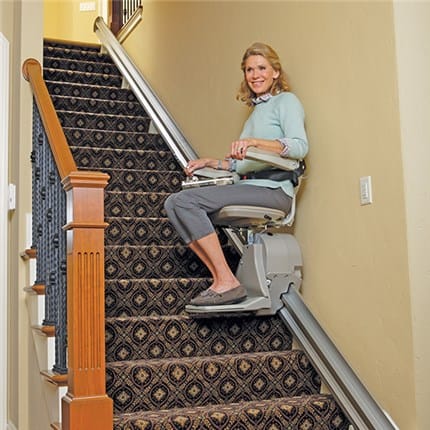Impairments in mobility have a direct and significant impact on mental health and wellbeing. In fact, issues surrounding mobility and autonomy for seniors can play a role in life quality and longevity. Consider this during Mental Health Awareness Month in May; reflect, learn, and share insights and information that may help those struggling with mental health decline.
Become a more informed patient, caregiver, or consumer regarding how impaired mobility impacts mental health and wellbeing. In fact, mental health is a hot social topic currently, responsible for holistic health issues widely. Mental Health Awareness Month in May sheds some light on the plight of those living with mental health issues and illnesses, but how does mobility come into the picture? Preserve your own autonomy and quality of life by enhancing access with mobility aids or devices, as needed.
Limited or impaired mobility impacts mental health, period:
Become More Aware
Perhaps the most important thing for consumers to do is to become more aware, more specifically, be open to mental health awareness. Mental Health Awareness Month is in May of each year and is a great time to become more educated that on the factors that influence your overall mental health and wellbeing. After all, nobody knows you as well as yourself- protect yourself and preserve quality of life by identifying issues with mental health sooner, instead of later.
If left untreated, mental health issues like depression and anxiety can impact overall independence, autonomy, and quality of life. This is especially threatening for seniors that may strive to stay in their own homes and age-in-place.
Do You Know the Signs?
Do you know the signs of a problem or what to look for? Some of the symptoms of mental health issues may include:
• Feelings of sadness or nervousness.
• Muscle weakness, tension, or lethargy.
• Headaches or chronic, physical ailments.
• Mood changes, impatience, anger, or irritability.
• Less motivation, ambition, or energy. Lack of interest in activities previously enjoyed.
• Issues with routine function, either at home or work.
• Difficulty paying attention or concentrating. Issues with memory; forgetfulness.
• Changes in sleep or eating habits.
• Feelings of hopelessness, guilt, or shame.
• Unhealthy behaviors, such as drinking, smoking, or using drugs.
If you or someone you care about is exhibiting any of these signs or experiencing these symptoms, call for help today.
Your Body and Mind are Connected
Did you know that your physical condition directly influences mental health and wellbeing? If you live and suffer from physical health issues, you are likely to be at-risk for mental health problems, too. Chronic pain, an infection, or limited mobility all can take a toll on your mental wellbeing, causing you stress, duress, and anxiety. Similarly, if you experience depression or mental health issues, these may manifest in physical ailments or episodes. Body and mind go hand-in-hand; remember this connection to stay holistically healthy.
Socialize to Stay Healthy
When mobility impacts socialization, you may notice mental health struggles. Research is increasingly recognizing the value of engaging with others and human interaction as a key element of longevity and quality of life. If you cancel outings or isolate due to limited mobility, your mental health is at risk. Socialize to stay healthy and implement mobility equipment and aids (like lifts or walkers) as needed to preserve these interactions. It is really that important.
Exercise Stimulates Endorphins
Many have indicated that exercise helps mental health; if your mobility prohibits regular exercise, you may find yourself experiencing the symptoms of mental health decline. Exercise is often prescribed to combat mental health issues like anxiety and depression; furthermore, it is effective at reducing aches and chronic pains. Preserving mobility through aids or other is well worth the effort as it may keep you moving; exercise stimulates endorphins which makes it a great, all-natural mood stabilizer.
Science Says It’s True
Can something as simple as mobility aids help mental health? We say yes… science seems to agree. Without this assistance when needed, a lack of access may lead to isolation, social anxiety, depression, and a decreased quality of life.
Mobility contributes to autonomy which often directly relates to mood and mental wellbeing.
You Can Help
But, what can you do? Talk to providers, caregivers, and anyone who will listen about issues that are impacting your holistic health. The stigma of mental health issues is over and people are much more open about problems and struggles- helping providers effectively treat their patients. Know that reporting these symptoms to your providers is the first step in moving past them and getting on with your life.
Call the mobility experts today and learn more about your options. Are mobility issues impacting your quality of life and mental health? Don’t live another day without the tools that you need for access, convenience, and joy in everyday life; contact us today.
President, Husband, Father, Grandfather Graduate of UC Davis- Bio Sci Major- Go Aggies! Jeff has extensive experience in all of Pacific Mobility’s products and services, and specializes in accessibility products as well as stairlifts, ceiling lifts and custom wheel chairs. His hobbies include spending time with family, gardening, mountain biking, exercising and off road motorcycle riding.
24 years as Owner/President of Pacific Mobility Center – selling, installing, and servicing stairlifts, porch lifts, ceiling lifts, pool lifts, handicap ramping, specialty wheelchairs, scooters, power wheel chairs, and other power mobility devices
Certified Environmental Access Consultant since 2008
Licensed General Contractor since 1998
Certified Aging in Place Specialist since 2016
Board Member for Home Access Professionals
Member of Association of Members of the Accessibility Equipment Industry (AEMA)




